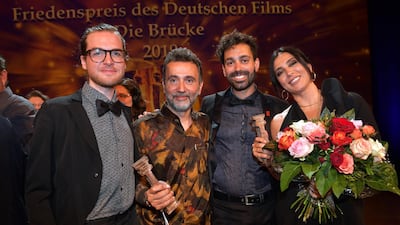The Munich Film Festival got underway last night (Thursday June 27), but before the festival began, as has been tradition since the award was created in 2002, the opening was preceded by the awarding of the annual German Film Peace Prize, Die Brucke (The Bridge), at Munich’s rococo Cuvilliés Theatre.
Two out of this year's three winners were from the Middle East. Nadine Labaki added yet more silverware to her already bulging trophy cabinet for her tale of refugee street kids in Beirut, Capernaum.
Talal Derki, meanwhile, was also rewarded for his extraordinary documentary Of Fathers and Sons, which saw the filmmaker spend over two years embedded with the Al Nusra Front on the front line of Syria's civil war, posing as a jihad-sympathising photojournalist in order to capture some incredible footage.
Both films have won multiple awards on the festival circuit already – highlights include Sundance's World Cinema Documentary Grand Jury Prize for Of Fathers and Sons: Children of the Caliphate, and the Cannes Jury Prize for Capernaum. Both films were also nominated for Oscars - Labaki's in the Best Foreign Language Film category, and Derki's for Best Feature Documentary.
A third Die Brucke Award this year went to the German writer, director, actor and comedian Michael “Bully” Herbig.
The former Lebanese interior minister, Ziyad Baroud, was in attendance to help present the prizes.
The awards were created in 2002, when Elisabeth Wicki-Endriss set up the Bernhard Wicki Memorial Fund in memory of her recently deceased husband, the seminal German director of films including 1959's Golden Globe-winning and Oscar-nominated anti-war film The Bridge.
Wicki would continue picking up awards right up until his death in 2000 – in that year he picked up the Austrian Cross of Honour for Science and Art.
The Brucke Award “stands for peace, enlightenment, understanding between nations and the inviolability of human dignity of every individual in any society, no matter what culture or religious heritage, no matter what kind of sex, race or flesh-colour.”
It claims to take its values from Wicki’s own words: “Film can’t change the world or make it a better place, but it can create a climate where things can grow and rise, and so maybe a change would be a hope.”

